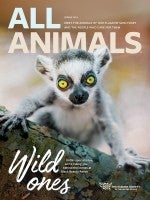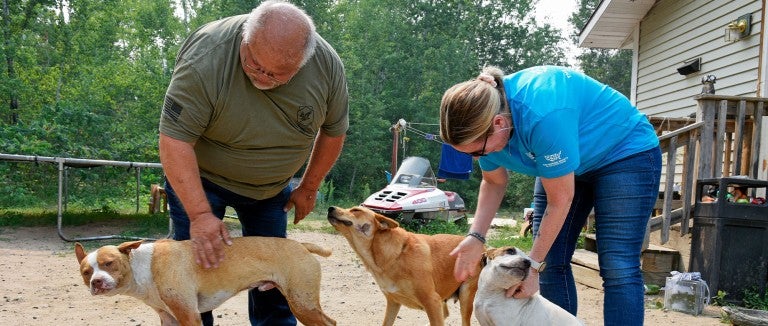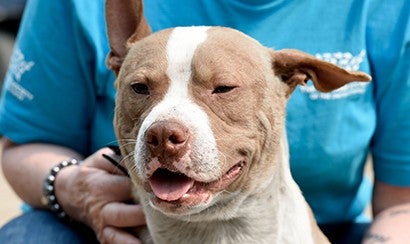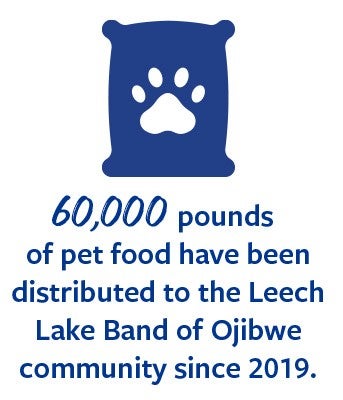In September 2020, Rick Haaland, the Pets for Life community outreach manager for the Leech Lake Tribal Police in northern Minnesota, answered a call about a large dog named Winston. The dog had gotten into an altercation with a porcupine and was covered in quills. When Haaland saw Winston at the family’s home, he wondered how the dog was still alive: Over 150 quills were sticking out of his face, shoulders and legs.
When Haaland opened the carrier to transport Winston to the veterinary office, Winston walked right in “as if he was ready to go,” Haaland says. At the clinic, veterinarians discovered that some of the quills were embedded in Winston’s joints. It would take multiple surgeries to remove them. Winston’s family was overjoyed he would survive but made the difficult decision to relinquish him because they could not afford the surgeries.
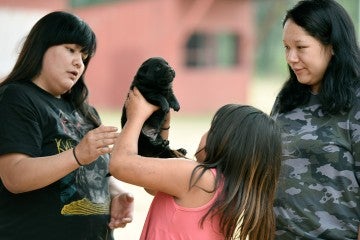
Rachel Thompson, senior program manager of operations and strategy for Pets for Life, says the tribal police—the department in charge of managing the program—was committed to supporting pet owners long before the mentorship began.
“I think they were doing Pets for Life, but just not calling it Pets for Life,” Thompson says. “If somebody had an issue, they were doing what they could to provide support rather than punishment.” The Pets for Life mentorship program gives communities tools to offer more of that support by providing trainings, financial assistance and ongoing guidance and advice. Haaland called Thompson for suggestions on how to help Winston; she recommended negotiating the veterinary bills.
The mentorship program identifies organizations that are committed to community-based work and have the capacity to take on Pets for Life, says Amanda Arrington, HSUS senior director of the program. “There is no lack of love for pets [in Leech Lake Band of Ojibwe], but there is a lack of access to services,” she notes. “That is the gap Pets for Life works to fill.”
Leech Lake Band of Ojibwe is the second Indigenous community to join the mentorship program—Blackfeet Nation in Montana joined in 2017—and Pets for Life plans to work with more Indigenous communities in the coming years. “The work that is happening at Leech Lake represents this much larger mission: for us to shine a light on the oppression and historical marginalization of Indigenous populations and to do our part to start to change that,” Arrington says.Thompson visited Leech Lake Band of Ojibwe in July 2021 to connect with local leaders and pet owners and learn about their needs. “One of the first things I noticed when working with this group was how connected to the community they were,” she says. “Because of that, they knew exactly what their community wanted and needed. Primarily it was just the most basic access to veterinary care.”
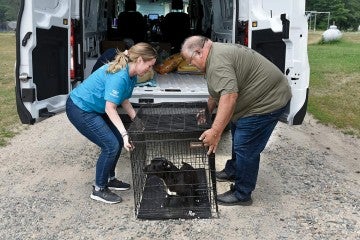
Leech Lake Band of Ojibwe is located in a remote area. Veterinary services are both difficult to access and prohibitively expensive. Haaland explains that lack of transportation is a major obstacle for pet owners—the nearest 24/7 emergency clinic is two and a half hours away.
“We lose way too many pets because it’s a weekend and we can’t get them in,” Haaland says.
Pets for Life is working to bridge the gap between pet owners and affordable, accessible medical care. In the long term, the team is working with the tribal police to build a veterinary clinic on the reservation. Meanwhile, the HSUS has provided a grant to cover veterinary care and pet supplies as well as a van to transport animals to veterinary clinics.
Want more content like this?
This was written and produced by the team behind All Animals, our award-winning magazine. Each issue is packed with inspiring stories about how we are changing the world for animals together.
Learn MoreSubscribe